April 2020
Message from the Executive Director
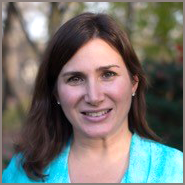 Dear Friends,
Dear Friends,
The month of April has been filled with challenges that we couldn’t have imagined only a few months ago. Keeping our families healthy is always a top priority and COVID19 has made this more evident than ever. NNPDF is here for you – we are here to help, to talk, to help find resources for your family, or just to listen.
We have added more Family Services programs offering more ways to connect, share, and learn for families at all stages of the Niemann-Pick journey, and we are helping community members through our Emergency Hardship Program. Click here for our listing of programs for May! And please remember to share the information on our Emergency Hardship Program widely, it’s an important community resource.
We know that many of our families are facing challenges right now and we want to know more. In May, you will receive an email with a survey asking you to share your story with us of how COVID19 is impacting your family, please take a moment to complete this. This information will help us better assist our families with programs needed, resources needed, and also prepare us for advocacy that may be needed throughout the country.
NNPDF is grateful to all our supporters for their gifts. Your support is needed now more than ever. If you’d like to help us to continue to serve the needs of our families, we appreciate your generosity and commitment.
Fondly,

Joslyn Crowe, MSW, MA
NNPDF Executive Director
NNPDF Pyramid Challenge 2020
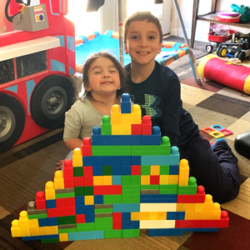 Looking for something fun to do to support your Niemann-Pick Community and raise awareness of Niemann-Pick disease? Join the NNPDF Pyramid Challenge 2020 and show us how YOU pyramid!
Looking for something fun to do to support your Niemann-Pick Community and raise awareness of Niemann-Pick disease? Join the NNPDF Pyramid Challenge 2020 and show us how YOU pyramid!
From now through May, post and share your creative pyramid on social pages. Go big or go small. Use #NNPDFPyramidChallenge2020 and @NNPDF in your caption to be entered in a drawing for one of three $50 Amazon Gift Cards! Enter as many times as you like!
Challenge your friends to “Do or Donate $20” to the NNPDF to help support Niemann-Pick families. Remember to tag #NNPDFPyramidChallenge2020 and @NNPDF.

NPD community… Show us how YOU pyramid!
NNPDF Family Support & Medical Conference
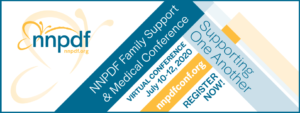 VIRTUAL CONFERENCE
VIRTUAL CONFERENCE
July 10 – 12, 2020
Registration Opening Soon!
In the Spotlight
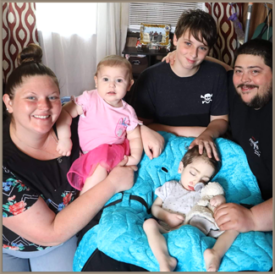 Kari Ezell
Kari Ezell
Mother of Corbin Edwards
(3/28/2017 – 9/10/2019) ASMD
Tell us a bit about yourself, such as where do you live and what do you enjoy doing.
My name is Kari Ezell and I was born and raised in a little town called Roanoke Rapids, North Carolina. Everyone knows one another in some way. There are creeks and a river. In the summer everyone likes to float the river but what I enjoy doing is being a stay at home mother to my 12 year old son, Kaleb and my 1 year old daughter, Caleesi. We are a very close family. I enjoy watching them have so much joy and laughter. They’re just so full of life. In my down time, I like to try out crafts.
When did receive your diagnosis? What led you to diagnosis?
When Corbin was born, he was a healthy baby boy. Just absolutely perfect. Around 3 months old, I began to worry about his development. He wasn’t doing anything that he should have been doing at his age. I brought these concerns up to the doctor but he said we had for wait until Corbin was 9 months old before he could be referred to physical therapy. In December of 2017, Corbin became very sick. His doctor found his liver and spleen to be enlarged. Corbin was then transferred to Greenville NC to Vidant Children’s hospital. He was diagnosed with RSV. Corbin underwent a liver biopsy. We were warned he may have a metabolic disorder. In January of 2018 the biopsy results showed white foaming cells. It was then sent to California for further testing. A couple of weeks later we got the news at Corbin’s doctor’s appointment that it was Niemann-Pick disease. We were referred to genetics where we learned about the different types and we were told they believed Corbin had type A. On February 22nd, I received the phone call that would change our lives forever. Corbin’s doctor confirmed Corbin in fact did have type A.
What were the first steps you took after diagnosis?
The first thing I did after receiving the results, I started to google this disease but information was scarce. I began to search Facebook and found Save Purnell. That’s when I really began to find others. I reached out and then I received a message from Melissa. She told me about this doctor in New York who specializes in this disease. I began to research Dr. Wasserstein and on May 1st we had Corbin in New York to meet with her.
How did you learn about NNPDF?
I learned about the NNPDF through a friend that had originally reached out. I reached out and was swarmed with support. It felt so good to know I wasn’t alone in this nightmare. I immediately sent a request to become a member of the group and was accepted into this new family.
What caused you to get involved with NNPDF initially and how has being an NNPDF member benefited your family?
The NNPDF has been amazing to my family. They’re always there when you need them. They check in. They care. The NNPDF donated to Corbin’s funeral fund. I was and still am truly grateful. My goal is to make others feel as welcomed as I did. I have people to reach out to me and it feels good to know I can help in some way and the children are just precious. I get to see and learn new things from these other parents just as they learn from me.
What changes have you seen in the Niemann-Pick environment over the past few years?
I have been seeing positive news about gene replacement therapy and it is so great. We need a treatment and cure. Not just a treatment for the symptoms.
What are your hopes for the future for yourself and for the Niemann-Pick community?
My biggest hope is that ASMD can be added to the newborn screening. If we can find out sooner that our children are sick, we can get help more quickly. I truly believe if we can get this news sooner that it will help keep others from being misdiagnosed. Which happens too often in the rare disease community. We need to raise awareness as much as possible in order for this to reach others. If people don’t know, they can’t help or help share our journeys. It’s important we let our voices be heard.
Newborn Screening
We are excited to announce the NNPDF Research Fellowships are OPEN for applications. The Peter G. Penchev Niemann-Pick Type C Research Fellowship and the Edward H. Schuchman ASMD Research Fellowship are 1-year awards intended for early-stage researchers. These awards support young scientists in pursuit of independent hypotheses and encourage scholarly development about Niemann-Pick disease.
Niemann-Pick disease research is one of the pillars of our mission and we are proud that since 1993, NNPDF has funded 52 grants and 18 fellowships totaling over $4,000,000. Our fellowships and grants have contributed to the identification of disease-causing genes, insights into the pathogenesis of NPC1 & NPC2, support of the NPC cat model at a critical juncture, and development of an assay for newborn screening. Many former grantees and fellows have remained active contributors in the Niemann-Pick disease space.
Contact [email protected] with questions.
NNPDF Research Fellowship Applications
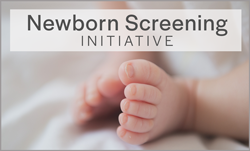 New Research Project Coming from the NPC Newborn Screening Working Group
New Research Project Coming from the NPC Newborn Screening Working Group
The NPC community is engaged in a multi-stakeholder effort to add NPC to newborn screening lists across the country (See Firefly Fund’s newborn screening initiative.) Since adding NPC to these lists would mean that all newborns would routinely be screened for this rare disease, it’s essential to demonstrate that intervening earlier in a patient’s disease progression is better and critical to improved health outcomes.
Within our small patient community, one way that leading NPC experts believe will help us tell this story is to look at families with multiple affected children.
Why is that? Often these families will have a child who, following significant symptom onset, is ultimately diagnosed with NPC. This diagnosis will trigger specific NPC testing of another child of the same family who – if affected – may be diagnosed before the onset of visible signs and symptoms. If we are able to describe the different diagnostic and clinical journeys of these children – based on timing of intervention – we could have powerful evidence demonstrating the benefit of screening for NPC at birth, and the criticalness of earlier intervention.
Please stay tuned to the NNPDF Newsletter and other NPC community information channels for an opportunity to participate in this important research project. Thank you!
Application deadline is June 1, 2020
NNPDF Cora Sterling Endurance Award
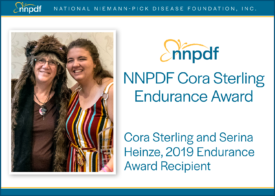 Do you know a great young person who shines for Niemann-Pick awareness?
Do you know a great young person who shines for Niemann-Pick awareness?
The NNPDF is seeking nominations for the NNPDF Cora Sterling Endurance Award. This award is presented annually at the NNPDF Family Support & Medical Conference to a young person (under age 25) who shines in raising awareness of Niemann‐Pick disease in the community. Nomination deadline is May 15th.
NNPDF Emergency Hardship Program
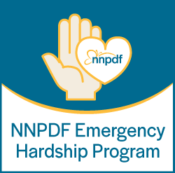 In this unprecedented time of COVID-19 the NNPDF Emergency Hardship Program can help with short term financial assistance to qualified NNPDF U.S. member families facing financial difficulties. For more information click here.
In this unprecedented time of COVID-19 the NNPDF Emergency Hardship Program can help with short term financial assistance to qualified NNPDF U.S. member families facing financial difficulties. For more information click here.
NPC Perspective
By Debbie Kaflowitz
Mother of Rachael (06/21/1985 – 10/25/2018) NPC
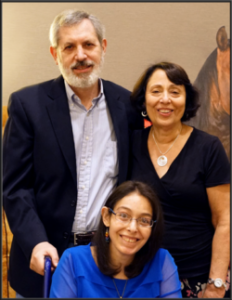 Hi Everyone,
Hi Everyone,
I’m sorry you haven’t heard from me in a while. I try to stay positive in my articles, but sometimes there is just too much reality going on. This past fall was a series of triggers of grief over Rachael’s passing. Sept 8th was the one-year anniversary from Rachael entering the hospital. Shortly afterwards, was our first Rosh Hashanah and Yom Kippur without her. October 25th marked the first anniversary of her death and on November 4th we had the unveiling of her headstone. I thought I had my act together when Thanksgiving snuck up on me, which had always been Rachael’s favorite holiday. However, throughout this time, whenever I posted something on Facebook, my NPC family always came through with posts of love and support. Thank you. And now we have Covid-19, so stay safe and healthy.
It has been said that happiness comes from feelings of belonging and success. Many adult onset children are lucky to have experienced both. However, as our adult children begin to decline, these opportunities become fewer and fewer. Peers move into the adult world with college, jobs, marriages, and children. Our children move backwards, and the worst part is, at least for a while, they are quite aware of what is happening. Feelings of loneliness and uselessness set in.
How do we fill their days with activities that make them feel successful and provide social opportunities? They want peers, not parents. As we, the parents get older, it becomes more difficult both physically and emotionally to fulfill our child’s needs.
The two biggest challenges are that programs and procedures vary from state to state, so there aren’t a series of steps I can give everyone to follow. Secondly, our children’s needs change as they decline, so a program that is a good match at age 20, might not be a good match at 22. On my Facebook page, “Aging with NPC,” I asked families of adult onset children what their child did during the day. The answers ranged from children sitting at home watching television, playing video games and just hanging out with children who were active with part-time jobs, a variety of therapies, and day programs.
What can you do to find the best daytime activities that meet the needs of your child and your family? There is no easy answer. I once saw a Facebook post that said something like “The parent of a child with a rare disease can dig up more information than the FBI.” That is so true. You’ve already become mother/father, caregiver, advocate, doctor, nurse, and specialist. It’s now time to put on a new hat, detective.
The first step is to look into state agencies. You can find these on the Internet under your state government. In New Jersey, we have DVR (Division of Vocational Rehabilitation) and DDD (Division of Developmental Disabilities). Rachael started with DVR when she graduated from her age-out program. DVR’s goal was to find employment for her with possible job coaching. Rachael’s support coordinators didn’t understand her. At this point, Rachael looked absolutely fine on the outside. However, her cognitive ability, especially following directions, and the ability to read social situations had declined. It soon became clear that she wasn’t functioning high enough to hold a job.
Rachael was then passed to DDD. Their job was to support day programs or other activities for Rachael. We received a case manager and a budget based on an evaluation. Rachael could use that money the way she wanted, as long as it was something on the approved DDD list. These case managers were not well versed in programs, so I wore my detective hat every minute I wasn’t teaching or sleeping. What a challenge! Rachael was high functioning in many ways. She loved arts and crafts, singing, and dancing. She had a wonderful way with young children. She still saw herself as a functioning adult. She didn’t want to be with “disabled” people because, according to her, she wasn’t one of them. We saw programs where people sat, doing one task all day long with some television breaks and places where there was little to no interaction among the clients. These were way too low functioning for Rachael.
Then there were programs mostly for drug and alcohol recovery or for people who had just taken wrong turns in their lives. These programs used discussion groups as their main focus, and with Rachael’s cognitive decline, discussion groups didn’t work. They also had minimal supervision because they were trying to get people back on their feet to operate in the real, adult world.
Rachael spent a lot of time at home, which were difficult years. Luckily, for the last 5 years of Rachael’s life, we were able to piece together the best programs and extra support possible for Rachael. We found two programs on the DDD list that worked. Two days a week, Rachael went to the WAE Center, (Wellness, Arts, and Enrichment) which was run by the Jewish Division of Developmental Disabilities. You didn’t have to be Jewish to attend. They served a variety of disabilities, such as blind, deaf, Asperger’s, developmentally challenged, etc. The staff members were wonderful, professional, caring people. They sang, cooked and provide exceptional art activities. Rachael didn’t make any friends to socialize with outside the center, but during the day, the staff had a talent for promoting interaction among the clients. Rachael and the staff members bonded, since she was higher functioning than many of the clients.
Rachael also spent 2 days a week at a rehab center called Universal Institute. It is actually for traumatic brain injuries, but they accepted Rachael. They too had a variety of classes that kept Rachael occupied and happy. There are several of those around the country, so you can check the Internet.
Lastly, we used care.com to find two women around Rachael’s age, one for a few hours on Monday and one for a few hours on Sunday. At first, they would go out to lunch, run some errands in town and spend time at the library. When Rachael’s decline made running errands too difficult, they would do art projects at home or watch a movie together. Care.com is nationwide. You do need to interview and check references for anyone you hire because care.com doesn’t do a thorough job. We paid them ourselves. I did need to try a variety of people before I found exactly the right match. One key for care.com is writing a good description of the kind of person you need. I would be happy to help you write the description, just email me at [email protected].
A NJ state financial-help program called The Preferred Preference Program was started about 2 years before Rachael passed. The goal of the program was to help people hire their own help, which included friends and family members. We could make Steve the employer and me the employee. After an evaluation, we received a specific number of weekly hours at a set rate. Each month, after I filled out and sent in a time sheet, we would receive a check that we used to defray other medical, program, transportation, and aide expenses we had for Rachael. You could use this money to pay anyone, such as a friend, an adult around you child’s age, a college student, anyone.
Many other adult onset families face the same challenges we did. Below are some activities that have worked for them.
Several people found one-to-one trainers at a gym who work with their children 1-3 times a week. You do need to find someone who understands the special needs of your child. For most of these places you need to pay yourself.
Don’t discount day programs that are more for the elderly population. Rachael always bonded more with the staff than the clients, anyway. The elderly also enjoy someone younger, so other bonds can occur.
Look for an art or music therapist. Rachael’s budget paid for an art therapist once a week through a program called Arts Unbound. Unfortunately, they closed down due to lack of funding.
See if there are any water therapy times at your nearest Y.
In Minnesota, a program called CDCS sounds very much like New Jersey’s Preferred Preference Program. Havi Martinez has more specific information. She can be reached at [email protected].
Havi also knows about a program called HopeKids, which is available in Minnesota, Arizona, Colorado, Middle Tennessee, North Texas, and Kansas City. According to Havi, it’s designed for children with life limiting illnesses, but if your child has aged-out of everything else, they sometimes continue helping people.
If you are tired of being a detective and would like me to look at your state website to find some leads, I will be happy to do so. Just email me at [email protected].
INPDR Update
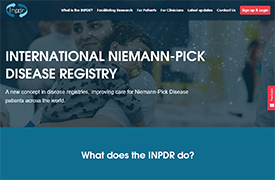 During our last update we gave assurances that our work would continue despite the COVID-19 pandemic. While this remains true the impact on clinical sites has enabled us to focus on the Patient Reported Database (PRD).
During our last update we gave assurances that our work would continue despite the COVID-19 pandemic. While this remains true the impact on clinical sites has enabled us to focus on the Patient Reported Database (PRD).
We have successfully tested the account reactivation process and those of you who already have a PRD account or have registered your interest before will soon receive an email to let you know what steps you need to take now that the PRD is back up and running.
If you have a PRD account or you have registered your interest online, please let us know if you have not received an email within the next two weeks about reactivating or setting up your account.
We are continuing to work with several clinical centres in the US and globally to enable clinicians to add patient data to the Clinician Reported Database (CRD). However, with the pressure of COVID-19 being felt so strongly from a clinical point of view, appointments with your physician may have taken a different form. If your physician or treatment centre isn’t signed up to the CRD or you haven’t given informed consent for your data to be added, you can mention it during your next appointment. We are always happy to help clinicians, patients and their families learn more about the Registry and get set up so please get in touch for more support.
In the meantime, now is as good a time as any to get involved with the Patient Reported Database and share your experience of living with Niemann-Pick disease.
Patients have always been at the heart of what we do and together we can harness the power of patient data and experience. Until we see some return to normality after the COVID-19 pandemic, the PRD is an opportunity for you to be part of that patient power without having to leave your home as sign up, consent and data are all done online through our website.
During our last update, we were excited to welcome Dr Conan Donnelly as our new Registry Manager. Already Conan has been making positive progress working with the team to develop our Business Plan, which will ensure we continue to work towards our objectives to make sure the INPDR supports the development of treatments, improved understanding and diagnosis and better quality of care – all through harnessing the power of patient data and experience, as well as ensuring the sustainability of the INPDR.
You can find more information and access the Patient Reported Database on the INPDR website www.inpdr.org. Plus don’t forget you can connect with us on Facebook @INPDR Twitter @inpdr_tweets and LinkedIn.
Over the next few weeks, we will be running a campaign across our social media channels to improve understanding of the INPDR, who we are and what we can achieve together. If you are already signed up to the Clinician Reported Database and/or the Patient Reported Database and would like your story featured, please get in touch with our Communications Consultant, Ange Wilson at [email protected].
As ever global pandemic or not we hope you are all keeping safe and well during these uncertain times.
Clinical Trial Updates
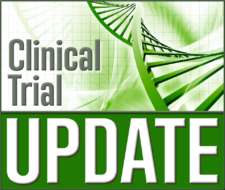 Clinical trials are currently in progress to study and develop treatments for ASMD and NPC. The NNPDF posts new information regarding clinical trial updates as soon as it is received. Visit our Clinical Trials web page for up to date information on all clinical trials.
Clinical trials are currently in progress to study and develop treatments for ASMD and NPC. The NNPDF posts new information regarding clinical trial updates as soon as it is received. Visit our Clinical Trials web page for up to date information on all clinical trials.
Updates from Cyclo Therapeutics:
Cyclo Therapeutics Inc. announces that it has closed a private placement of its securities with a group of accredited investors. Click here for complete announcement.
Fundraising & Awareness Opportunities
 Contributions through fundraising by NNPDF members, families and friends are used to provide services and information to individuals and families affected by NPD, as well as supporting research into finding treatments. Please continue to host and support NPD fundraisers. Awareness Events promote awareness to the general public about Niemann-Pick disease. Click here to view current and past fundraising and awareness events.
Contributions through fundraising by NNPDF members, families and friends are used to provide services and information to individuals and families affected by NPD, as well as supporting research into finding treatments. Please continue to host and support NPD fundraisers. Awareness Events promote awareness to the general public about Niemann-Pick disease. Click here to view current and past fundraising and awareness events.
Facebook Fundraisers
THANK YOU to those of you who have already hosted a Facebook Fundraiser! Are you interested in hosting? It is a great opportunity to raise awareness and funds for the NNPDF. If you are hosting a Facebook fundraiser please email the NNPDF Central Office at [email protected] to let us know.
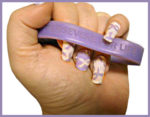 Jamberry Niemann-Pick disease Nail Wraps
Jamberry Niemann-Pick disease Nail Wraps
Show your support in the fight against Niemann-Pick disease with these custom Jamberry nail wraps. 30% of all sales will be donated to the National Niemann-Pick disease Foundation for family support services. Click here for ordering details. Available year round.
Have you hosted a fundraiser for NNPDF recently?
Send us your photos and we’ll share them and details from your event in upcoming newsletters!
Upcoming Events
Check out our Upcoming Events page.
Stay Connected With Us
A quick reminder that if you are not receiving our NNPDF monthly newsletter via email or have recently changed your address or email, please click here to join us or to update your information.
